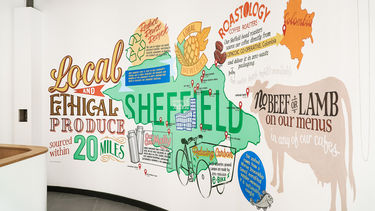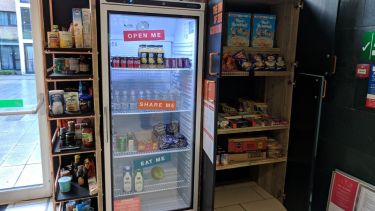Food and Drink
Providing affordable, healthy food with a lower environmental impact across campus.

Food is one of the most visible ways our sustainability commitments show up in everyday life at the University of Sheffield. From cafés and refectories to events and vending, the choices we make about what we serve, how it is produced and how much is wasted all have an impact on our health, our climate footprint and our local community.
Our aim is to offer food and drink that is tasty, affordable and convenient, while steadily reducing the carbon and nature impacts linked to what we buy and how we operate. That means shifting towards more plant rich menus, making lower carbon choices the easy and attractive option, and working closely with suppliers on issues such as animal welfare, deforestation free sourcing, packaging and transport. It also means paying attention to nutrition and wellbeing, so that our food offer supports healthy lifestyles as well as environmental goals.
A key part of this approach is working with local suppliers where we can. Partnerships with local businesses such as Our Cow Molly, a dairy farm just four miles from campus, help shorten supply chains, support local jobs and improve traceability, while giving our food offer a strong sense of place. By sourcing more of what we serve from within the region, we can reduce transport related emissions, build longer term relationships with producers and reflect Sheffield’s identity in what people eat and drink on campus.
Food waste is another priority. Wasted food represents wasted emissions, land, water and money. We are improving how we measure and manage waste in our catering operations, expanding redistribution where possible and designing menus and service models that reduce leftovers in the first place. At the same time, we are exploring how surplus food and unavoidable waste can be handled in the most sustainable way, including composting and anaerobic digestion.
Our long term ambition is to make Sheffield’s food system as low carbon and nature positive as reasonably practicable, while maintaining choice and quality for staff, students and visitors. Food and drink on campus should feel like part of the solution to climate change, not part of the problem.
Targets and commitments
- Achieve ALARP (as low as reasonably practicable) for food-related emissions by 2030, on a pathway towards net zero food emissions by 2048.
- Increase the availability and visibility of lower-carbon, plant-rich options across all University-managed catering outlets.
- Work with suppliers to improve the environmental and ethical standards of food and drink, including provenance, animal welfare and deforestation-free sourcing.
- Reduce food waste in University-managed catering through better measurement, menu planning, portioning and stock management.
- Expand opportunities to redistribute surplus edible food and to divert unavoidable food waste into more sustainable treatment routes such as composting or anaerobic digestion.
- Improve clarity of information at the point of purchase so that customers can make more informed, sustainable and healthy choices.
- Integrate food and drink considerations into wider sustainability planning, including Scope 3 emissions reporting and biodiversity and nature commitments.
Menus of Change
The University of Sheffield has registered for the Menus of Change framework, which commits us to incorporating the 24 principles of healthy and sustainable menus into our food service operations. This involves a commitment to providing nutritious and environmentally responsible food choices for students, staff, and visitors, including diverse menus and a range of vegetarian and vegan options.
The 24 principles, by which we will measure our progress, are broken down into two key sections:
- Menu concepts and general operations
- Be transparent about sourcing and preparation
- Buy fresh and seasonal, local and global
- Reward better agricultural practices
- Leverage globally inspired, largely plant-based cooking
- Focus on whole, minimally processed foods
- Grow everyday options, while honouring special occasions and traditions
- Lead with menu messaging around flavour
- Reduce portions, emphasising calorie quality over quantity
- Celebrate cultural diversity and discovery
- Design health and sustainability into operations and dining spaces
- Food and ingredients
- Think produce first
- Make whole, intact grains the new norm
- Limit potatoes
- Move nuts and legumes to the centre of the plate
- Choose healthier oils
- Go ‘good fat’, now ‘low fat’
- Serve more kinds of seafood, more often
- Re-imagine dairy in a supporting role
- Use poultry and eggs in moderation
- Serve less red meat, less often
- Reduce added sugar
- Cut the salt; rethink flavour development from the ground up
- Substantially reduce sugary drinks; innovate replacement
- Drink healthy: from water, coffee, and tea to (caveats) beverage alcohol
Community food projects
We support a number of initiatives to try to ensure unwanted, edible food is not wasted but instead goes to where it is needed.
Community fridges
We have two community fridges located at our halls of residences (at Ranmoor and Endcliffe), and one located in the Students’ Union building (ground floor, next to Our Shop). These fridges provide a place for students, the local community and local supermarkets to donate food they don't need or that would otherwise go to waste, for other students and residents to use. Since launching in 2017, over 30 tonnes of food waste has been donated and taken from the fridges, thereby diverting edible food from landfill.
Food banks
Our residences also work closely with local foodbanks, ensuring that food left over at the end of term does not go to waste. Our staff also run regular food donation events throughout the year through our Green Impact scheme.
Save Our Sandwiches
Save Our Sandwiches is a student volunteering group which aims to collect leftover food from around campus, such as cafes and catered lunches, and distributes it to people in need across the city. Staff are encouraged to contact the group if they have leftover edible food for collection, helping Save Our Sandwiches collect and redistribute hundreds of sandwiches a week.

